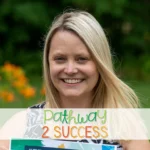The end of the year is a chaotic time for kids, but especially for teachers! During this time, it’s so helpful to have a toolbox of fun and meaningful activities for kids to complete. Many of these ideas you really can do on your own. Of course, if you’re needing ideas and resources fast, I’ve […]
13 Ways to Avoid Power Struggles
As an educator or parent, getting into a power struggle can be an awful thing. We waste so much of our energy trying to get we we want that we sometimes forget what our goal was in the first place. Power struggles can be especially difficult with kids with ADHD, autism, oppositional-defiant disorder, and other […]
How to Make a Coping Strategies Wheel
One of my favorite ways to sneak social emotional learning into the classroom is by doing crafts. These activities can be hands-on, engaging, fun, and creative. Meanwhile, kids are still learning the critical skills they need. In particular, a coping strategies wheel is a great tool to help teach coping strategies to help manage stress. […]
25 Ways to Integrate Social Emotional Learning
Kids and young adults need social-emotional skills to be successful at school, home, and for the rest of their lives. These are the skills that help kids build confidence, understand their own strengths and weaknesses, collaborate with others, navigate social situations, develop strong relationships, and make better decisions. Without a doubt, these are critical skills […]
15 Tips for Leading a Social Skills Group
As a middle school special educator, social skills have been one of my favorite areas to teach. These skills are so important but often get left behind, especially in the upper grades. These are a number of roadblocks to teaching social skills to kids and young adults, including now having enough time, difficulty scheduling a […]
Teaching Kids Self-Love in the Classroom
Today’s kids and young adults have too much negative energy all around them. Whether it is negative comments on social media, means texts going back and forth, or just overhearing the daily news, kids are drowning in negativity. With all of that considered, it can’t be said enough how much kids NEED positivity in their […]
Teaching Social Problem-Solving with a Free Activity
Kids and young adults need to be able to problem-solve on their own. Every day, kids are faced with a huge number of social situations and challenges. Whether they are just having a conversation with a peer, working with a group on a project, or dealing with an ethical dilemma, kids must use their social […]
How to Build Escape Room Challenges
Escape room activities are a fun and interactive way to work on the skills kids need. My favorite part about escape room activities is that they really encourage cooperation and critical thinking skills. Kids work together and use their collective brain power to solve a variety of puzzles and challenges. When an escape room is […]
10 Mindfulness Activities You Can Try Today
All kids benefit from practicing mindfulness. Who wouldn’t love the kids and young adults we work with to become more focused, calm, in control, and self-aware? Mindfulness is a technique that can help teach and strengthen those abilities over time. By practicing mindfulness, people can learn to become more aware of their own thoughts, feeling, […]
10 Reasons to Use Escape Room Activities
Escape rooms are not only the latest craze, but a tool that can help kids work towards their learning goals. An escape room is a challenge that allows kids to work together solving a variety of puzzles in order to “break out” of a room. There are different “reasons” for why kids are locked it. […]
- « Previous Page
- 1
- …
- 17
- 18
- 19
- 20
- 21
- …
- 27
- Next Page »













